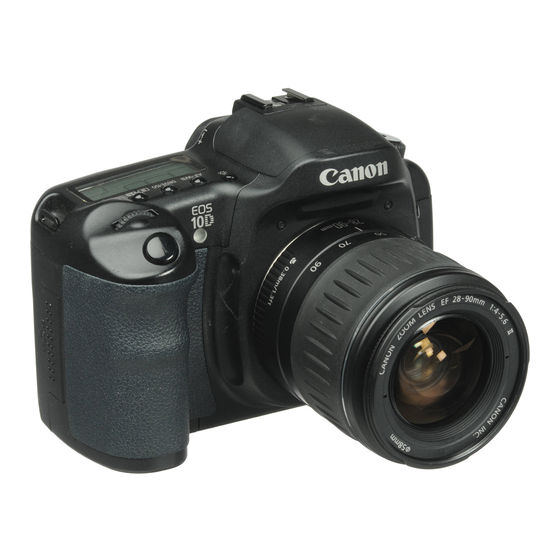- ページ 22
ソフトウェア Canon EOS EOS 300DのPDF 取扱説明書をオンラインで閲覧またはダウンロードできます。Canon EOS EOS 300D 41 ページ。 Canon eos 300d: software guide
Canon EOS EOS 300D にも: 取扱説明書 (28 ページ), ソフトウェアマニュアル (13 ページ)

Converting and Saving Images in a Single Operation (Batch-processing)
You can save and rename multiple edited images in a single operation. You can also convert edited RAW images to JPEG or TIFF and save them in a single operation.
Edit an image
.
1
(p.1-6 to p.1-12)
Select images to be
2
converted and saved in a
single operation.
Click the [Batch process]
3
button
.
(p.1-2)
The [Batch process settings]
dialog box appears.
Alternatively, you can display this
dialog box by selecting [File] menu
[Batch process].
Specify the settings.
4
Click the [Execute] botton.
5
The processing window appears,
allowing images to be saved in a
single operation.
When processing is complete, the
images are saved in the specified
folder and the [Terminate] button
appears on the processing
window.
Click the [Terminate] button.
6
You cannot save multiple images in a single operation unless you specify [Sequence
number] when the [New file name] is selected for [File name].
You can also save and rename multiple images without editing them in a single
operation.
[Resize setting] changes the image size by applying the larger numeric value set in
"Width" or "Height" to the longer edge of the image, even when horizontal and vertical
images are mixed together.
The batch process function is independent of other functions. Therefore, during batch
saving, you can perform other operations in the main, edit and edit image windows.
Displays the file names of the images to be saved as a batch.
Specify a value between 1 and 60,000 dpi
as the output resolution used for the
images to be saved.
Check this checkbox to change the size of
the images to be saved.
Set the width of the images.
Check this checkbox to fix the vertical/
horizontal ratio of the images.
Select this to save images without
renaming them.
Select this to rename images while
saving them.
Transfers images converted/saved in
a single operation to image editing
software (p.1-18).
Select an image type used when the images are saved.
For the image type and extension used when the image is
saved, refer to the table in [Convert and save] (p.1-15).
Specify the folder where the images are to be
saved after conversion. The specified folder
name appears to the side of the [Browse] button.
If you have selected [Exif-JPEG] in the [Kind of file]
list box, set the image quality (compression rate)
with a range of 1 to 10 by dragging the slider left or
right. Higher values give better JPEG quality.
Check this checkbox to embed an ICC profile
in the images to be saved.
Set the height of the images.
Select a unit of measurement.
Specify the character string and sequence number
when [New file name] is selected.
The set content is displayed as an example in [Ex.].
You can store the set sequence numbers.
Starts batch processing.
Cancels all settings and closes the window.
If you have saved an image in which [Wide Gamut RGB], [Apple RGB] or [ColorMatch
RGB] color space (p.1-9, p.1-21) has been specified, an ICC Profile is automatically
embedded even if you have not checked [Embed ICC profile].
The specified preferences (p.1-21) or individually specified color space (p.1-9) are
added to the ICC profile embedded in TIFF or JPEG images. An ICC profile contains
color information, such as color properties and color spaces of devices which are
authorized by International Color Consortium (ICC). With this ICC profile, many color
management systems can minimize the color differences between devices.
Cover/Table of
Contents
Introduction
Displaying Thumbnail Images
1
and Performing Basic Edits
in the Main Window
2
Performing Detailed
Edits in the Edit
Window
3
Performing Detailed
Edits in the Edit
Image Window
Displaying an
4
Image in the Quick
Check Window
5
Reference
Index
1-16
